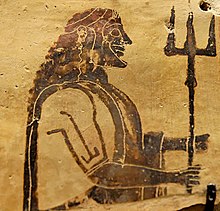Trident of Poseidon

The trident of Poseidon and his Roman equivalent, Neptune, has been their traditional divine attribute featured in many ancient depictions. In Hesiod's account, Poseidon's trident was crafted by the three Cyclopes. According to Robert Graves, however, both Poseidon's trident and Zeus' thunderbolt were originally a sacred labrys, but later distinguished from each other when Poseidon became god of the sea, while Zeus claimed the right to the thunderbolt.[1] In another view shared by Friedrich Wieseler, E. M. W. Tillyard and several other researchers, Poseidon's trident is a fish spear, typical for coast-dwelling Greeks.[2] In that sense it resembles the arrow-headed pronged fork, used by the Mediterranean fishermen to catch eels. Poseidon became particularly worshipped in coastal countries, where fish formed a basic commodity of trade. According to competing proposal by H. B. Walters, Poseidon's trident is derived from Zeus' lotus sceptre, with Poseidon being Zeus in his marine aspect.[2]
Myths[edit]
In Greek myths, Poseidon wields his trident on a number of occasions. During the contest with Athena over the possession of Attica Poseidon strikes the Acropolis with the trident to produce a well of seawater.[3] In a similar myth Poseidon strikes the ground with trident to produce a horse for mankind, while his rival Athena produces an olive tree. The oldest coins of Poseidonia from the 6th century BC depict trident wielded by Poseidon in his right hand, similar to Zeus's thunderbolt. An Attic red figure kylix from c. 475 BC depicts Poseidon killing the Giant Polybotes with his trident.[4] In another myth, Poseidon creates a spring or springs with the strike of his trident to reward Amymone for her encounter with him.[5] In a version of another myth Poseidon wields his trident to scare off a satyr who tries to rape Amymone after she mistakenly hits him with a hunting spear.[5] There is also a myth where Poseidon touches the island of Delos with his trident, affixing it firmly to the sea floor.[6] Another myth tells how Poseidon, enraged by sacrilegious behavior of Ajax the Lesser, splits with trident the rock to which Ajax was clinging. While visiting Athens, geographer Pausanias was shown within the Erechtheion the alleged print of Poseidon's trident on a rock and related sea well which, he writes, gave forth the sound of waves when the south wind blew.[3]
Symbolism[edit]
The trident of Neptune was viewed by Roman scholar Maurus Servius Honoratus as three-pronged because "the sea is said to be a third part of the world, or because there are three kinds of water: seas, streams and rivers".[7] According to the second and third Vatican Mythographer, Neptune's trident symbolizes the three properties of water: liquidity, fecundity and drinkability.[7]
Modern references[edit]
In present times Poseidon's trident is featured particularly on the flag of Barbados,[8] the coat of arms of Liverpool City Council, the seal of the Greek Navy, the Special Warfare insignia of the U.S. Navy SEALs and the badge of USS John S. McCain. A series of American fleet ballistic missiles Trident is named after Neptune's trident,[9] as well as Operation Neptune Spear. The personification of Great Britain, Britannia is depicted with the trident of Poseidon as a symbol of naval power. The logo of car manufacturer Maserati is based on the trident from the statue of Neptune in Bologna.[10]
The trident of Poseidon is a magical artifact with destructive powers in Michael Livingston's 2015 historical fantasy novel The Shards of Heaven.[11][12]
The Trident of Poseidon is one of the key features in the plot of Pirates of the Caribbean: Dead Men Tell No Tales. Henry Turner, aided by Jack Sparrow, seeks the trident in order to break a sea curse that has been placed on his father.